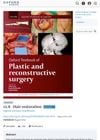An Adult With Hair Loss: A Rare Case of Non-Classical 3β Hydroxysteroid Dehydrogenase Deficiency
May 2021
in “
Journal of the Endocrine Society
”
3β Hydroxysteroid Dehydrogenase deficiency 3β HSD deficiency steroid biosynthesis adrenals gonads low testosterone male pattern hair loss decreased libido scalp hair loss ACTH Cortisol TSH Free T4 Estrone DHEA Total testosterone Free testosterone LH FSH Estradiol 17-hydroxyprogesterone DHEA-S Androstenedione Dihydrotestosterone delta-4 steroids menstrual irregularities hirsutism aromatase steroids

TLDR A woman's hair loss and other symptoms were due to a rare hormone deficiency treatable with steroids.
The document presents a rare case of a 33-year-old female with suspected non-classical 3β Hydroxysteroid Dehydrogenase (3β HSD) deficiency, a condition that affects steroid biosynthesis in both the adrenals and the gonads. The patient was referred to endocrinology for low testosterone, male pattern hair loss, and decreased libido for 2 years. She reported increased axillary and pubic hair growth but loss of scalp hair. Lab results showed normal sodium and potassium, A1c 5.2%, ACTH of 7.2, Cortisol of 8.2, TSH of 1.43, Free T4 of 1.28, Estrone 102, Normal DHEA 133, Total testosterone <3, Free testosterone 0.4, LH 7, FSH 9.6, Estradiol 45.9, low 17-hydroxyprogesterone of 11, DHEA-S of 88, low Androstenedione of 28 and Dihydrotestosterone 6.3. The patient's delta-4 steroids were low, indicating 3β HSD deficiency. This condition often manifests as menstrual irregularities and hirsutism along with possible male pattern hair loss of varying degrees in women. The normal levels of estradiol and estrone are likely due to peripheral conversion of androstenedione by aromatase. 3β HSD deficiency is usually treated with steroids which helps resolve most symptoms.

